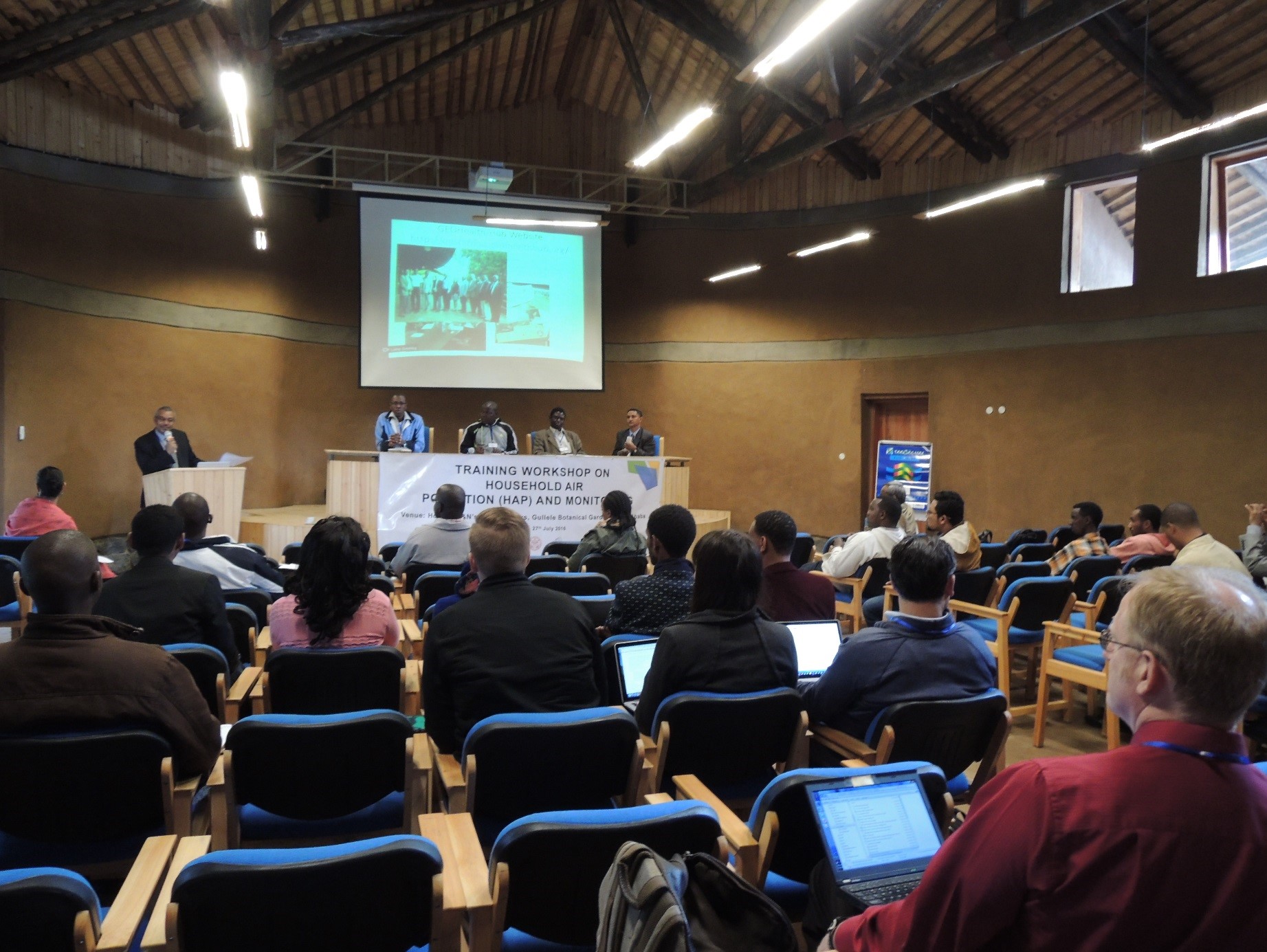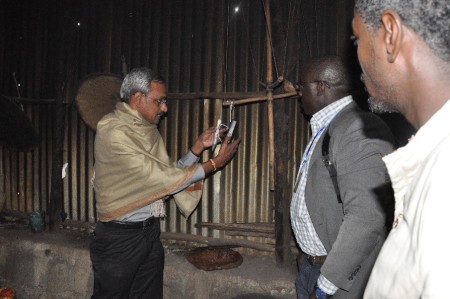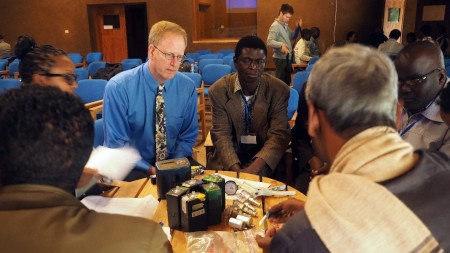XÂY DỰNG NĂNG LỰC GIÁM SÁT Ô NHIỄM KHÍ TRONG NHÀ TẠI ĐÔNG PHI
Ngày 22/8/2016 – Tin tức Liên minh

Giáo sư Kiros Berhane (USC) điều phối một hội thảo nhóm với các nhà điều tra chính từ
bốn trung tâm y tế GEO Đông Phi (từ trái sang phải: Uganda, Rwanda, Kenya, and Ethiopia)
Có khoảng cách lớn về năng lực nghiên cứu và đánh giá ô nhiễm khí trong nhà (HAP) tại các nước có nhu cầu cấp thiết nhất về các hành động can thiệp. Trong một phần hỗ trợ khai trương Trung tâm Y tế GEO Đông Phi gần đây, Liên minh đã tài trợ một hội thảo kỹ thuật về giám sát HAP tại Addis Ababa, Ethiopia quy tụ 45 nhà nghiên cứu khắp thế giới đến tìm hiểu các phương pháp đo lường mới và thảo luận các nhu cầu nghiên cứu tương lai.

Những người tham gia thực hành triển khai các nguyên mẫu môi trường
tại các gia đình thực tế ở Addis Ababa.
Hội thảo 3 ngày đã được tổ chức với sự hợp tác của Đại học Addis Ababa và được chủ trì bởi Trung tâm và Mạng lưới Môi trường Khu vực Sừng Châu Phi (HoA-REC&N) tại cơ sở của họ ở Vườn Bách thảo Gullele. 45 người tham gia đã quy tụ lại từ Bangladesh, Canada, Ethiopia, Gambia, Ấn Độ, Kenya, Rwanda, Uganda, Peru, và Mỹ.
Những người tham gia đã khám phá nhiều phương pháp và công nghệ hiện có để giải quyết các vấn đề nghiên cứu, thu được kinh nghiệm tại chỗ khi triển khai một loạt nguyên mẫu môi trường di động tại các mô hình gia đình bán đô thị, và được tiếp cận với các chiến lược thuyết minh và quản lý dữ liệu. Các bài giảng, hoạt động và thảo luận nhóm đã nêu bật khả năng độc đáo của Liên minh có thể quy tụ kiến thức từ khắp nơi trên thế giới, thấu hiểu được các thách thức phương pháp luận mà nhiều khu vực đang đối mặt, và nâng cao năng lực địa phương để đánh giá và xử lý các tác động của HAP vốn đang gây bệnh dịch cho một nửa dân số thế giới.

Những người tham gia tìm hiểu cách sử dụng nhiều loại nguyên mẫu môi trường.
Ngoài sự kiện đào tạo, Giám đốc cao cấp về nghiên cứu và đánh giá của Liên minh, Sumi Mehta, đã gặp các đại diện của Tổ chức Y tế Thế giới, Học viện Khoa học Ethiopia, và Tổ chức Thoracic Society. Các kế hoạch đang được lập để Liên minh tiếp tục hoạt động tại Ethiopia, cũng như cho sự tiếp tục của chương trình đào tạo giáo dục y khoa liên tục đã diễn ra tại Ghana từ đầu năm nay.
Xin xem chi tiết về buổi phỏng vấn Tiến sĩ Mehta trên một kênh tin tức địa phương thảo luận về ô nhiễm khí trong nhà và sức khỏe tại Đông Phi!
(Bài viết trích từ website của Liên minh Bếp sạch Toàn cầu)
CAPACITY BUILDING FOR HOUSEHOLD AIR POLLUTION MONITORING IN EAST AFRICA
August 22, 2016 Alliance News

Prof. Kiros Berhane (USC) moderating a panel discussion with the principal investigators from the four Eastern Africa GEO Health hubs (left to right: Uganda, Rwanda, Kenya, and Ethiopia)
There is a major gap in capacity for research and evaluation of household air pollution (HAP) in countries with the most pressing needs for interventions. In support of the recent launch of theEastern Africa GEO Health Hub, the Alliance sponsored a technical workshop on HAP monitoring in Addis Ababa, Ethiopia gathering 45 researchers from around the world to learn innovative measurement methods and discuss future research needs.

Participants practiced deploying environmental samplers in real homes in Addis Ababa.
The 3-day workshop was organized in partnership with Addis Ababa University and hosted by the Horn of Africa Regional Environment Center and Network (HoA-REC&N) at their training facility in the Gullele Botanical Garden. The forty-five participants hailed from Bangladesh, Canada, Ethiopia, the Gambia, India, Kenya, Rwanda, Uganda, Peru, and the United States.
Participants explored different methods and technologies available for addressing different research questions, gained hands-on experience deploying a variety of portable environmental samplers in real semi-urban household settings, and were exposed to data management and interpretation strategies. The lectures, activities, and group discussions highlighted the unique ability of the Alliance to gather knowledge from around the world, gain insight into the methodological challenges that different regions face, and strengthen local capacity to evaluate and address the effects of HAP that plague nearly half of the world’s population.

Participants learned how to use a multitude of environmental samplers.
In addition to the training event, the Alliance’s Senior Director of Research and Evaluation, Sumi Mehta, met with representatives of the World Health Organization, the Ethiopian Academy of Sciences, and the Thoracic Society. Plans are underway for continued Alliance presence in Ethiopia, as well as the replication of the Continuing Medical Education training that took place in Ghana earlier this year.
Be sure to check out Dr. Mehta’s interview on a local news channel discussing household air pollution and health in Eastern Africa!
(Source: from website of the Global Alliance of Clean Cookstoves)